The UK and US will wait "until Germany is mortally wounded by the Russian offensive"
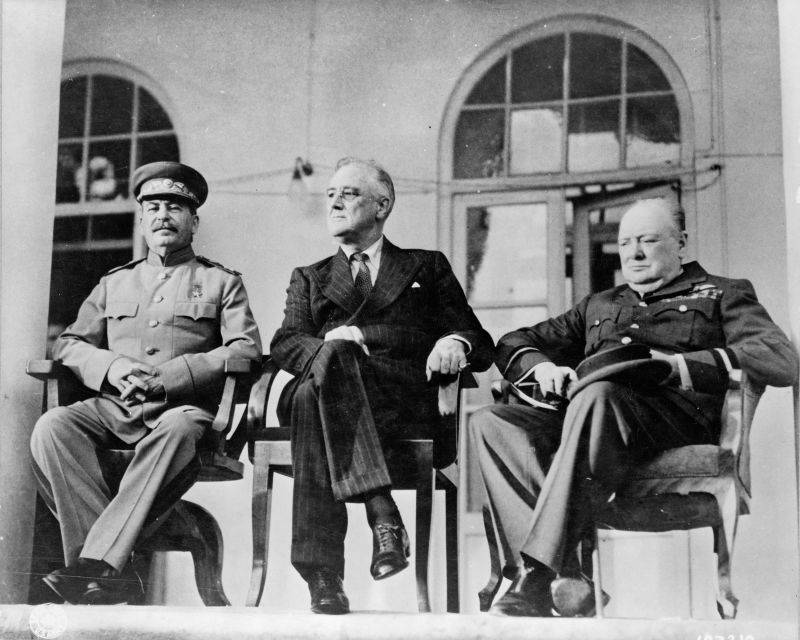
prehistory
The leaders of the great powers gathered in Tehran to resolve a number of difficult issues related to the continuation of the war against Nazi Germany, the post-war structure of Europe and the entry of the USSR into the war with Japan.
First we had to decide where to hold the conference. In Western Europe there was nowhere or it was dangerous to hold a meeting of the Big Three. The Americans and British did not want to hold the conference on Soviet territory. In August 1943, Moscow was informed that neither Arkhangelsk nor Astrakhan were suitable for such a conference. Roosevelt and Churchill proposed a meeting in Fairbanks, Alaska.
Stalin refused to leave Moscow for such a long distance at such a tense time. The Soviet leader proposed holding a meeting in a state where there were representations of all three powers, for example, in Iran. In addition to Tehran, Cairo (proposed by Churchill), Istanbul and Baghdad were considered as “conference capitals”. We settled on Tehran, since at that moment it was controlled by Soviet and British troops, and there was also an American contingent there.
The Iranian operation (Operation "Concord") was carried out by Anglo-Soviet troops at the end of August - the first half of September 1941 (How the USSR and England occupied Iran in 1941). Allied forces occupied Iran due to a number of military-strategic and economic considerations. The USSR and England preventively eliminated a potential bridgehead of the Third Reich and brought Iranian oil fields under control. Also, the Russians and the British created a southern transport corridor through which the allies could support Russia as part of the Lend-Lease program.
Units of the Red Army occupied Northern Iran. British troops controlled the southwestern provinces of Iran. American troops, under the pretext of protecting cargo delivered to the Soviet Union, entered Iran at the end of 1942. Without any formalities, the Americans occupied the ports of Bandar Shahpur and Khorramshahr. An important communication line now passed through Iranian territory, through which American strategic cargo was transferred to the USSR.
In general, the situation in Iran, although difficult, was controlled. The Soviet 182nd Mountain Rifle Regiment was stationed in the Persian capital, guarding the most important facilities (before the start of the conference it was replaced by a more trained unit). Most ordinary Persians treated Soviet people with respect. This facilitated the actions of Soviet intelligence, which easily found willing assistants among the Iranians.
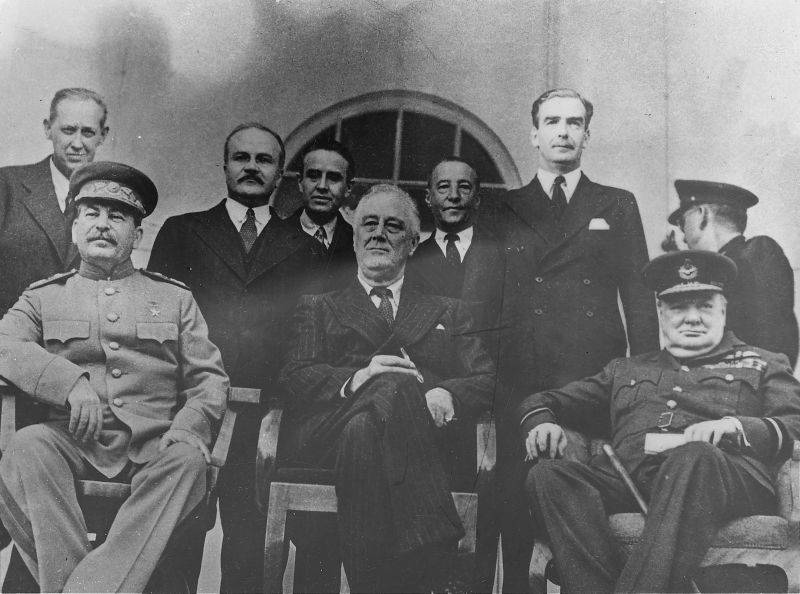
Marshal of the Soviet Union, Chairman of the Council of People's Commissars of the USSR and Chairman of the State Defense Committee of the USSR Joseph Vissarionovich Stalin, US President Franklin Roosevelt and British Prime Minister Winston Churchill at the Tehran Conference. Standing from left to right: US Presidential Advisor Harry Hopkins, USSR People's Commissar for Foreign Affairs Vyacheslav Mikhailovich Molotov. Second from right is British Foreign Secretary Anthony Eden. November 29, 1943
Arrival of the Big Three in Iran
Stalin refused to fly by plane and went to the conference on November 22, 1943 on letter train No. 501, which traveled through Stalingrad and Baku. Beria was personally responsible for traffic safety; he was traveling in a separate carriage. The delegation also included Molotov, Voroshilov, Shtemenko, relevant employees of the People's Commissariat of Foreign Affairs and the General Staff.
We took off from Baku on two planes. The first was flown by ace pilot, commander of the 2nd Special Purpose Air Division Viktor Grachev; Stalin, Molotov and Voroshilov were flying on the plane. Commanding aviation long-range Alexander Golovanov personally flew the second aircraft.
Churchill went from London to Cairo, where he was waiting for the American president to once again coordinate the positions of the United States and England on the main issues of negotiations with the Soviet leader. Roosevelt crossed the Atlantic Ocean on the battleship Iowa, accompanied by a significant escort. After a nine-day sea passage, the American squadron arrived in the Algerian port of Oran. Roosevelt then arrived in Cairo. On November 28, delegations of the three great powers were already in the Iranian capital.
Due to the threat from German agents, extensive measures were taken to ensure the security of the Big Three. The USSR delegation stopped on the territory of the Soviet embassy. The British settled on the territory of the British embassy. The British and Soviet diplomatic missions were located on opposite sides of the same street in the Iranian capital, no more than 50 m wide. The American president, due to the threat of sabotage, accepted an invitation to live in the building of the Soviet embassy. The American embassy was located on the outskirts of the city, which seriously impaired security capabilities.
The meetings took place at the Soviet embassy, where Churchill walked along a specially built covered corridor that connected the Soviet and British missions. Around the Soviet-British diplomatic complex united by this “security corridor,” the Soviet and British intelligence services created three rings of reinforced security, supported by armored vehicles. The entire press in Tehran had to stop its activities, telephones, telegraph and radio communications were turned off.
Berlin, relying on numerous agents, tried to organize an assassination attempt on the leaders of hostile powers (Operation Long Jump). However, Soviet intelligence knew about this operation. In addition, Soviet intelligence officers, together with their British colleagues from MI6, took direction and deciphered all messages from German radio operators who were preparing a bridgehead for the landing of a sabotage group. The German radio operators were intercepted, and then the entire German intelligence network (more than 400 people) was captured. Some of them were converted. The assassination attempt on the leaders of the USSR, USA and England was prevented.
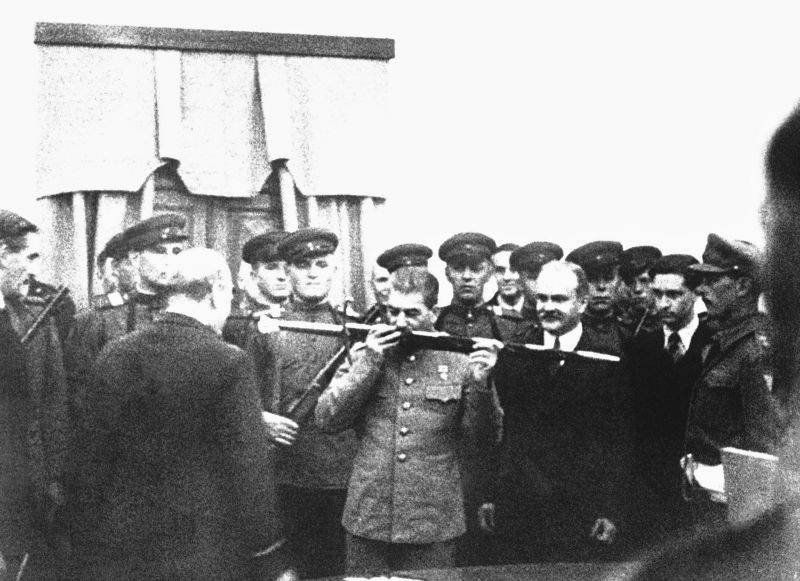
Stalin kisses the "Sword of Stalingrad" at the presentation ceremony in the conference room of the Soviet embassy during the Tehran Conference. British Prime Minister Winston Churchill stands in front of J.V. Stalin. To the right of Stalin is the People's Commissar for Foreign Affairs of the USSR V. M. Molotov. “Sword of Stalingrad” is an award sword made by special order of King George VI of Great Britain as a sign of admiration for the courage and fortitude of the defenders of Stalingrad. Kept in the Museum of the Battle of Stalingrad. November 29, 1943
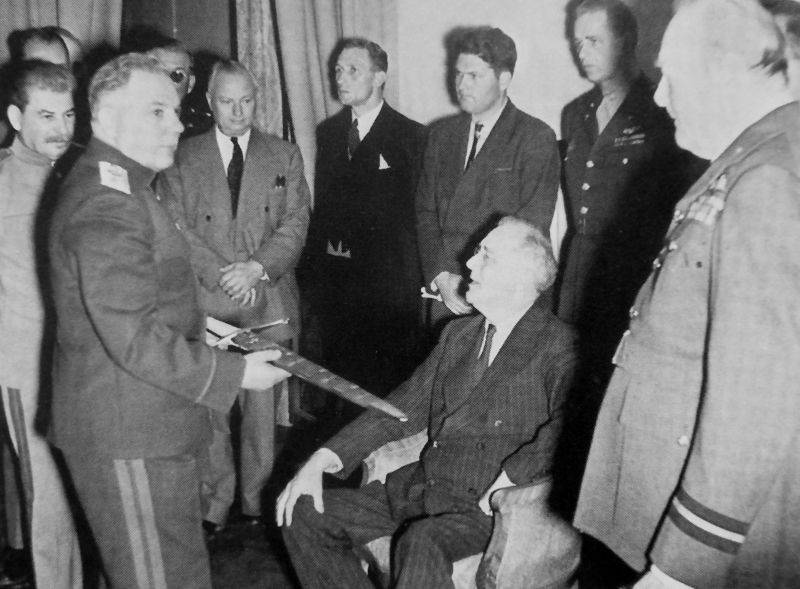
Member of the State Defense Council of the USSR Kliment Efremovich Voroshilov (holds the Stalingrad sword after the presentation ceremony in the conference hall of the Soviet embassy during the Tehran Conference. After the presentation ceremony, the sword was examined by US President F. Roosevelt (sitting in the center), and after that Voroshilov again accepted the king’s award Great Britain George VI and handed it over to an officer of the Soviet honor guard. On the left in the frame is Stalin, on the right is Churchill. Behind Roosevelt stands his son, US Air Force Colonel Elliott Roosevelt, who served as the president's aide-de-camp during the conference.
The problem of opening a “second front”
Among the most important issues discussed in Tehran were:
1) the problem of the Allies opening a “second front”. This was the most difficult question. England and the United States did their best to delay the opening of a second front in Western Europe. In addition, Churchill hoped to open a “Balkan Front” with the participation of Turkey in order to, by advancing through the Balkans, cut off the Russians from the most important centers of Central Europe;
2) the Polish question - about the borders of Poland after the war;
3) the issue of the USSR entering the war with the Japanese Empire;
4) the question of the future of Iran, granting it independence;
5) issues of the post-war structure of Europe - primarily decided the fate of Germany and ensuring security in the world after the war.
The decision to open the so-called The “second front”, that is, the landing of Allied troops in Europe and the creation of the Western Front, was supposed to significantly accelerate the fall of the Third Reich. After the strategic turning point in the Great Patriotic War, which occurred during the Battles of Stalingrad and Kursk, the situation on the Eastern (Russian) Front developed favorably for the USSR.
German troops suffered irreparable losses and could no longer make up for them, and the German military-political leadership lost the strategic initiative in the war. The Wehrmacht switched to strategic defense. The Red Army pushed back the enemy, liberated the Donbass and other regions of the Ukrainian SSR, crossed the Dnieper and recaptured Kyiv. The Russians drove the enemy out of the North Caucasus and landed in Crimea.
But victory was still far away; the German Empire was still a formidable adversary with powerful armed forces and strong industry. The Germans controlled vast areas of the USSR and Eastern, Southeastern, Central and Western Europe. It was possible to accelerate the defeat of the Third Reich and its allies only through the joint efforts of the three great powers.
The Allies promised to open a second front back in 1942, but a year passed and there was no progress. Militarily, the Allies were ready to begin the operation by July-August 1943, when a fierce battle was taking place on the Eastern Front on the Oryol-Kursk Bulge. An expeditionary army of 500 was deployed in England, which was in full combat readiness, it was provided with everything necessary, including ships and vessels for combat cover, fire support and landing. The Allies could provide air superiority. The generals were eager to fight.
The front was not opened mainly for geopolitical reasons. London and Washington were not going to help Moscow. Soviet intelligence found out that in 1943 the Allies would not open a second front in northern France. They would wait "until Germany was mortally wounded by the Russian advance."
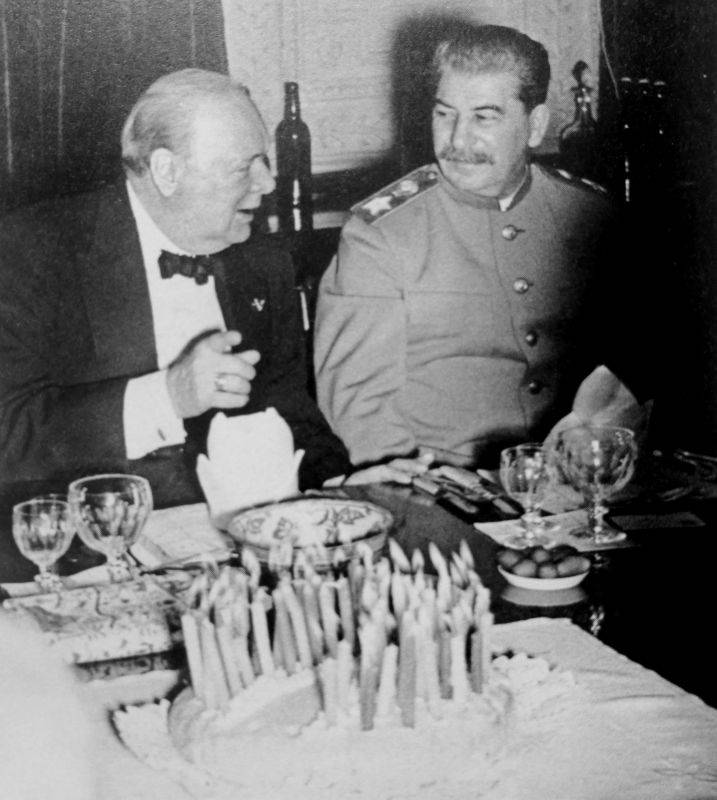
Joseph Stalin and British Prime Minister Winston Churchill at a reception at the British Embassy on the occasion of Churchill's birthday during the Tehran Conference. November 30, 1943
It must be remembered that London and Washington were the instigators of World War II (World War II - the war of the USA and England against the USSR; Origins of World War II: USA vs. All). They raised Hitler, helped the Nazis take power, restore the military and economic power of the Reich, and allowed Berlin to crush most of Europe. The Third Reich was a “battering ram” for the masters of the West to crush Soviet civilization.
At first, the masters of the West believed that Germany would be able to crush the USSR, but during this duel of titans it would be weakened, which would allow the Anglo-Saxons to force the Reich to a peace that was beneficial to them, or to finish it off. This made it possible to appropriate all the fruits of victory in the world war, subjugate all of Europe and gain the wealth of Russia. Only after it became obvious that Hitler’s Germany would not be able to defeat Russia-USSR, London and Washington revised their scenario for a world war.
The British and Americans developed a strategic plan to attack from the south, through Italy and the Balkans. Rome had to go over to the side of the Anglo-American bloc. With the help of Turkey, launch an offensive in late autumn on the Balkan Peninsula. Until that time, we continue to wait and see what happens at the front in Russia. There was a possibility that the Germans would create a strong strategic defense on the Eastern Front, and the Second World War would follow the scenario of the First World War. The mutual and protracted slaughter of the Russians and Germans strengthened the tandem of England and the USA.
The Anglo-American leadership believed that in the summer of 1944 the Germans would be able to launch a new strategic offensive on the Eastern Front, but after some successes they would be stopped and driven back again. Germany and the USSR will suffer huge losses and their armed forces will be drained of blood. At the same time, plans were being developed for the landing of allied troops in Greece and Norway.
Thus, the masters of the West waited until the last moment that the USSR and Germany would be exsanguinated during the titanic battle. This will allow Britain and the United States to act from a position of strength and dictate the conditions of the postwar world order.
The British and Americans convinced the Russians that the landing in northern France was complicated by a lack of transport, which created a supply problem. Allegedly, drawing Turkey into the war and advancing through the Balkans is a more profitable scenario. This will allow the allies to connect on Romanian territory and strike Germany from the south.
In fact, Churchill wanted to cut off most of Europe from the USSR. This also made it possible to develop new anti-Soviet scenarios and weaken the importance of the Red Army at the final stage of the war. In particular, the scenario of an anti-Hitler coup in Germany was being worked out, when the new German leadership would understand the hopelessness of the situation and agree to a separate agreement with England and the United States. The Germans will allow Anglo-American troops into their territory to save the country from the Red Army.
As a result, the main combat potential of the Wehrmacht, directed against the USSR, was preserved. After the war, an anti-Soviet buffer was created from regimes hostile to the USSR in Finland, Poland, Romania, Hungary and the new Germany.
After much debate, the issue of opening a second front was at a dead end. Then Stalin expressed his readiness to leave the conference:
Churchill realized that the issue could not be heated up any further and made a compromise. Roosevelt and Churchill promised the Soviet leader to open a second front in France no later than May 1944. The final time of the operation was planned to be determined in the first half of 1944. During the Allied operation, Soviet troops had to launch an offensive to prevent the transfer of German divisions from east to west. The allies also agreed to take measures to assist the Yugoslav partisans.
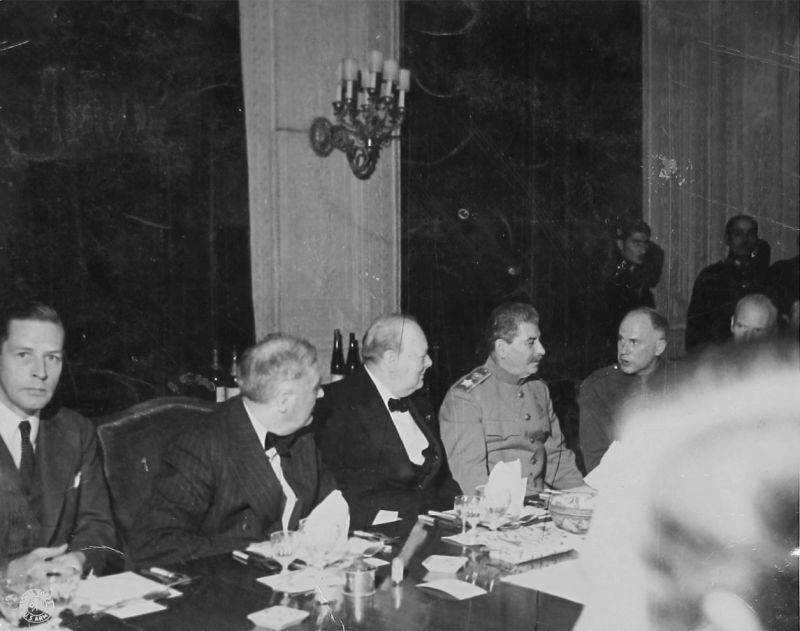
I. Stalin, W. Churchill and F. Roosevelt at the negotiating table at the Tehran Conference
Poland and Iran
The future of Poland has also caused serious controversy.
Preliminarily, we were able to agree that the eastern border of the Polish state would run along the so-called. "Curzon Lines". This line basically corresponded to the ethnographic principle: to the west of it there were territories with a predominance of the Polish population, to the east - lands with a predominance of the Western Russian and Lithuanian population.
They decided to satisfy Warsaw’s territorial appetites at the expense of Germany (Prussia), which occupied significant Slavic and Polish lands back in the Middle Ages.
Stalin rejected the claims of Roosevelt and Churchill for Moscow's recognition of the Polish émigré government in London. The Anglo-Saxons planned to plant their puppets in Poland. The Soviet delegation did not agree to this and stated that the USSR was separating Poland from the emigrant government in England.
The Big Three adopted the Iran Declaration. The document emphasized the desire of Moscow, Washington and London to preserve the sovereignty and territorial integrity of Iran. It was planned to withdraw the occupying forces after the end of the war.
Stalin was not going to leave Iran in the clutches of the Anglo-Saxons. During his stay in Tehran, Stalin studied the general condition of the Iranian elite, the influence of the British on it, and became acquainted with the state of the army. It was decided to organize an aviation and tank schools, transfer equipment to them in order to organize the training of Iranian personnel. It was beneficial for Moscow to create an Iran independent from the West in the future.
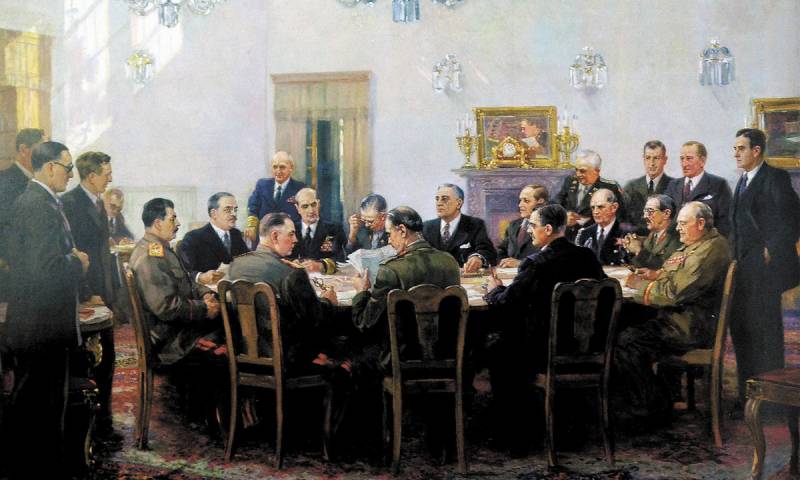
People's Artist of the USSR A.M. Gerasimov was sent to Tehran these days to paint the painting “Tehran Conference of the Leaders of the Three Allied Powers.” The painting was completed in 1945. It depicts not only the leaders of the three great powers, but also the officials who took part in the conference. There are 21 people depicted in total.
Stalin saves Germany from dismemberment
During a discussion of the post-war structure of Western Europe, the American president proposed dividing Germany after the war into 5 autonomous state entities and establishing international control (in fact, England and the United States) over the most important German industrial regions - the Ruhr, Saarland, etc. Churchill also supported him.
Churchill also proposed creating the so-called. “Danube Federation” from the Danube countries, with the inclusion of southern German territories in it. It was practically proposed to return Germany to the past - to dismember it. This laid a real “mine” under the future structure of Europe. England and the USA could destroy such a Europe at any moment and start another quarrel.
Stalin did not agree with this decision and proposed to transfer the German issue to the European Advisory Commission. The USSR, as an indemnity, received the right to annex part of East Prussia after the victory. Subsequently, the Soviet leader remained in the position of preserving the unity of Germany. Germany should be grateful to Moscow for maintaining the unity of the state and the people.
US President Roosevelt proposed the creation of an international organization (this issue has already been discussed with Moscow) on the principles of the United Nations. This organization was supposed to provide lasting peace after the Second World War. The committee, which was supposed to prevent the start of a new war and aggression from Germany and Japan, included the USSR, the USA, Great Britain and China. Stalin and Churchill generally supported this idea.
We also agreed on the Japanese issue.
The Soviet delegation, taking into account the repeated violations by the Empire of Japan of the 1941 Soviet-Japanese treaty on neutrality and assistance to Germany (plus the need for historical revenge for 1904–1905), and also meeting the wishes of the allies, declared that the USSR would enter the war with Japan after the final defeat of the Third Reich.
As a result, Stalin won a convincing diplomatic victory at the Tehran Conference. He did not allow the “allies” to push through the “southern strategy” - the allied offensive through the Balkans, and forced the allies to promise to open a second front.
The Polish issue was resolved in the interests of Russia – the restoration of Poland was due to the ethnically Polish regions once occupied by the Germans. The emigrant Polish government, which was under the control of England and the United States, was not recognized by Moscow as legitimate.
Stalin did not allow Germany to be killed and dismembered, which was historical injustice and created a zone of instability on the western borders of the USSR. Moscow benefited from a neutral, unified German state as a counterbalance to England and France. In essence, Stalin foresaw the possibility of a future strategic alliance between Russia and Germany - which was written about by Russian military analysts back in the Russian Empire and the father of the German school of geopolitics, K. Haushofer.
In the second part (published in 1941) of his article “The Continental Bloc: Berlin – Moscow – Tokyo,” Karl Haushofer wrote:
However, Hitler did not listen to the wise man, but destroyed the Third Reich.
Regarding Japan, Stalin allowed himself to be “persuaded,” but, in fact, a lightning operation against the Japanese was in the strategic interests of Russia and the USSR. Stalin took historical revenge on Russia for the war of 1904–1905, returned lost territories and restored the military-strategic and economic positions of the USSR in the Asia-Pacific region. During the war with Japan, the Soviet Union gained powerful positions on the Korean Peninsula and China.
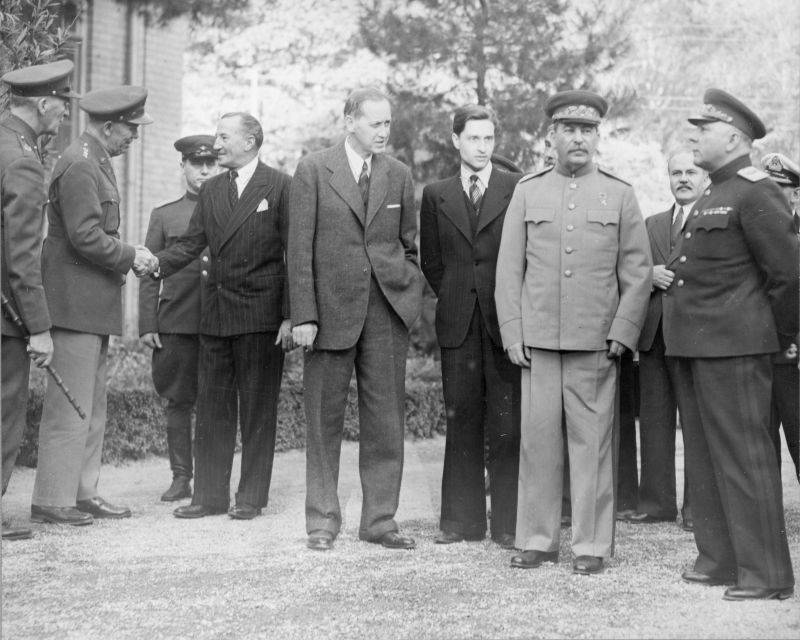
Soviet and allied delegations near the Soviet embassy in Tehran. From left to right: unknown British officer, General George C. Marshall (US Chief of Staff) shakes hands with Archibald D. Clarke Kerry (British Ambassador to the USSR), member of the American delegation Harry L. Hopkins, Soviet translator, future diplomat Valentin Berezhkov, Chairman of the Council of People's Commissars USSR J.V. Stalin, Foreign Minister V.M. Molotov, Chairman of the Armistice Commission K.E. Voroshilov. December 1943
Information